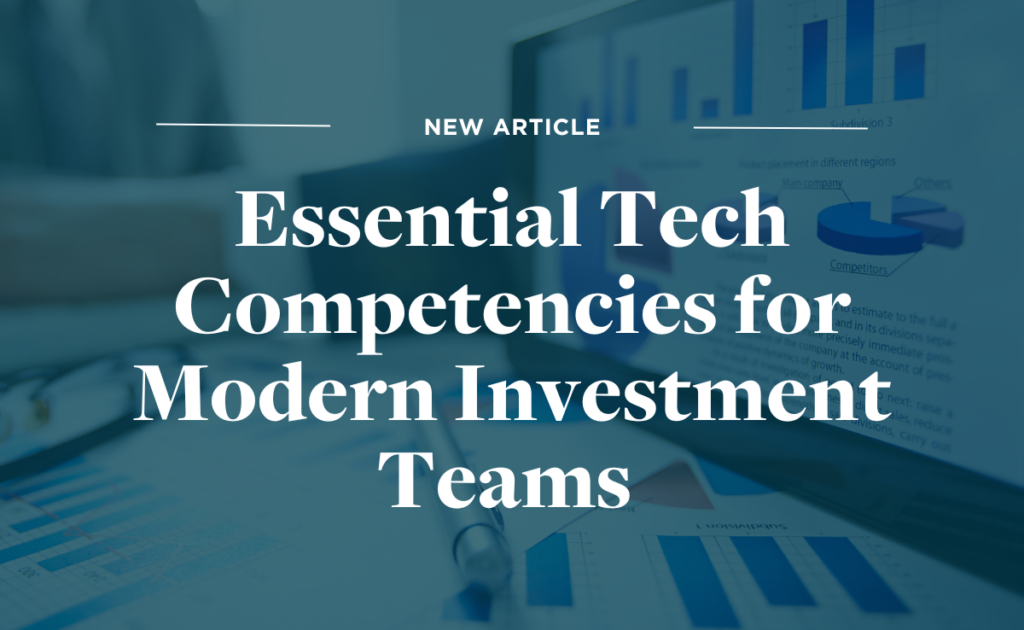For investment teams, mastering technological capabilities is no longer a luxury—it’s essential for staying competitive and making informed decisions in fast-moving financial markets.
Essential Tech Competencies for Modern Investment Teams

Technology moves fast. And for investment teams, this means they must not only be aware of these changes but master the tech competencies that drive decision-making and performance. Why? Because relying solely on instinct and spreadsheets no longer cuts it. Modern investment demands an interplay of tech-savviness and strategic acumen. Let’s break down the essentials.
Data Analytics: The New Gold Standard
Gone are the days when investment decisions were based solely on gut feelings or vague economic forecasts. Today, data analytics is the backbone of any serious investment strategy. Teams need the ability to:
- Analyse vast datasets in real-time
- Identify patterns and predictive insights
- Assess risks with surgical precision
Consider tools like Alteryx or Tableau. They turn overwhelming numbers into digestible insights. But it’s not just about having the tools; it’s about knowing how to wield them effectively. Can your team interpret these insights to pivot strategy? If not, you’re leaving money on the table.
For experienced professionals, the challenge is often not gathering data but avoiding paralysis by analysis. Sophisticated investment teams focus on creating actionable insights—turning raw data into strategic moves without losing sight of the bigger picture.
Cloud Computing: Collaboration Without Limits
Investment teams are often dispersed across cities, sometimes continents. How do you maintain seamless collaboration? Enter cloud computing. Platforms like Microsoft Azure or AWS allow real-time access to data, models, and reports. But more importantly, they foster:
- Secure, instant communication
- Centralised knowledge sharing
- Scalable computing power for crunching heavy models
If your team still emails Excel files back and forth, it’s time for a serious upgrade. High-performing teams leverage cloud solutions for everything from scenario analysis to real-time portfolio monitoring. It’s not just about speed; it’s about staying competitive in an industry where seconds matter.
Cybersecurity: Protecting the Crown Jewels
Let’s not mince words: investment data is a goldmine for hackers. And with cyber threats becoming more sophisticated, safeguarding your digital assets is non-negotiable. Essential cybersecurity practices include:
- Multi-factor authentication (MFA)
- Regular penetration testing
- Encrypting sensitive information
But here’s the kicker: cybersecurity isn’t just IT’s problem. Every team member must understand basic protocols. After all, one weak link—like a careless click on a phishing email—can compromise the entire operation.
Advanced teams are now exploring zero-trust architectures, which assume that every connection—internal or external—could be compromised. This mindset ensures that security remains a top priority at every level of the organisation.
Machine Learning: Smarter, Faster Decisions
Machine learning (ML) has moved from buzzword to boardroom reality. Whether predicting market trends or automating portfolio management, ML gives investment teams an edge. Imagine algorithms that:
- Identify undervalued assets before human analysts
- Optimise trading strategies in milliseconds
- Reduce human error in complex calculations
Of course, implementing ML isn’t as simple as plugging in a software. It requires a culture of continuous learning and experimentation. Are you ready to trust AI to refine your investment models? For veteran professionals, this can mean unlearning decades of instinct-driven decision-making to make room for data-driven strategies.
Blockchain: Beyond Cryptocurrency Hype
Blockchain technology isn’t just about Bitcoin; its potential for secure, transparent transactions is transforming asset management. From streamlining due diligence to enabling smart contracts, blockchain offers:
- Enhanced transparency in transactions
- Faster settlement times
- Reduced operational costs
But here’s a reality check: adopting blockchain means more than just understanding its basics. It involves rethinking traditional processes. Are you prepared to challenge the status quo? Leading firms are already exploring tokenisation of assets, offering fractional ownership and unlocking liquidity in previously illiquid investments. These advancements demand a mindset shift that goes beyond traditional investment frameworks.
Automating Operational Efficiency
Operational efficiency is the silent enabler of investment success. Robotic process automation (RPA) is revolutionising repetitive, time-consuming tasks such as compliance reporting, data entry, and client onboarding. Automation frees up valuable time, allowing teams to focus on high-impact activities.
Tools like UiPath or Blue Prism are being adopted by top-tier firms to streamline operations and reduce human error. But automation isn’t just about cutting costs; it’s about creating a resilient infrastructure that scales with growth. Have you reviewed your operational processes to identify areas ripe for automation?
Adaptability: The Overarching Competency
Technology evolves—rapidly. What’s cutting-edge today might be obsolete tomorrow. This brings us to the final, overarching competency: adaptability. Modern investment teams must:
- Stay updated on tech trends
- Foster a culture of innovation
- Be willing to unlearn outdated practices
It’s not about jumping on every tech bandwagon but identifying which innovations genuinely align with your goals. For seasoned professionals, this might mean stepping outside of their comfort zones and embracing lifelong learning. Firms that prioritise adaptability often find themselves ahead of the curve, ready to seize opportunities that others overlook.
Wrapping It Up
The investment landscape is shifting, and technology is at the heart of this transformation. For modern investment teams, mastering these tech competencies isn’t optional; it’s essential. The question isn’t whether you can afford to invest in these skills—it’s whether you can afford not to. As technological advancements continue to disrupt the industry, only the teams that evolve will thrive. So, what’s your next move?